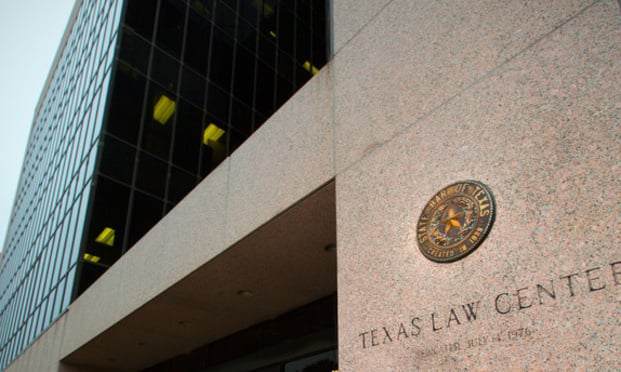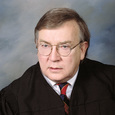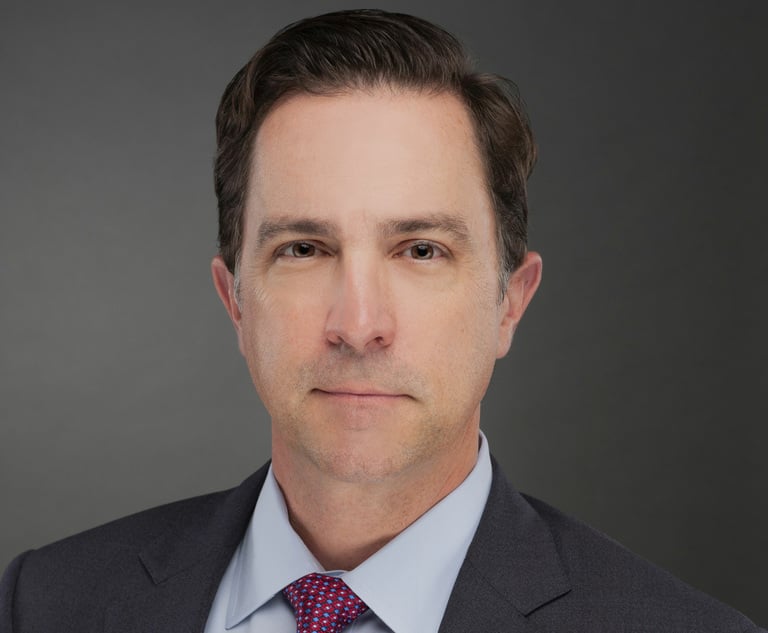Case to Dismantle Mandatory Texas Bar Teed Up for Summary Judgment Ruling
U.S. District Judge Lee Yeakel of Austin said during a hearing Thursday that the record before him contains everything he needs to dispose of the case on the merits, and he’d issue an opinion as quickly as he could.
August 01, 2019 at 03:35 PM
5 minute read
 The State Bar of Texas, Austin. Photo: Joel Salcido
The State Bar of Texas, Austin. Photo: Joel Salcido
U.S. District Judge Lee Yeakel of Austin said he would soon rule on a legal challenge by three attorneys who argue that mandatory bar membership and compulsory bar dues violate their First Amendment rights.
Yeakel said during a hearing Thursday that the record before him contains everything he needs to dispose of the case on the merits, and that he’d issue an opinion as quickly as he could. He then dismissed the plaintiffs’ motion for a temporary injunction, which asked the court to protect the lawsuits from repercussions for not paying their bar dues while the lawsuit is pending.
 Judge Lee Yeakel
Judge Lee Yeakel“You’ve focused the court on what the court needs to consider,” Yeakel said.
The attorney-plaintiffs in McDonald v. Sorrels claim the bar violates their First Amendment rights by forcing them to join and pay mandatory dues, which the bar then spends on alleged political and ideological activities. They object to the bar’s LGBT continuing legal education offerings, pro bono program for undocumented immigrants, attorney diversity programs, a $65 legal aid fee and the bar’s legislative affairs activities.
The case used to be named McDonald v. Longley but changed names when the bar presidency passed in June from 2018-219 Bar President Joe Longley to 2019-2020 Bar President Randy Sorrels.
The case is similar to legal challenges that lawyers have filed against mandatory bar associations in other states, which all rely on a 2018 U.S. Supreme Court ruling in Janus v. AFSCME, which ruled that public sector nonunion workers cannot be required to pay union dues as a condition of employment.
The plaintiffs argued in a motion for summary judgment that Janus shows that the bar can’t force lawyers to associate with an organization that engages in political and ideological activities. Lawyers can’t be compelled to pay for bar activities beyond attorney regulation and the improvement of legal services, they claim.
 Jeffrey Harris
Jeffrey HarrisPlaintiffs lawyer Jeffrey Harris, partner in Consovoy McCarthy Park in Arlington, Virginia, told the court that his clients have a powerful First Amendment interest not to join the bar and fund its activities, but the bar doesn’t have a compelling government interest in mandatory membership and compulsory dues.
Twenty-eight states have voluntary bar associations that still regulate attorneys, and the Texas bar has not shown evidence that it couldn’t do the same, he said. The bar should narrowly tailor its operations and ensure it’s using the least restrictive means, he said.
Yeakel asked Harris whether past Supreme Court cases dealing directly with bar associations had ever ruled that narrow tailoring applies to bar associations. When Harris replied that Janus addressed narrow tailoring regarding labor unions, Yeakel said that Janus did not mention the bar-specific case law. Only the Supreme Court may change its own precedent, he said.
“They didn’t change it in Janus,” Yeakel said.
The bar has argued in a cross motion for summary judgment that Janus shouldn’t apply to mandatory bar associations and that it’s already complying with other U.S. Supreme Court cases that directly impact bar associations by ensuring all dues pay for core functions like regulating the legal profession and improving the quality of legal services.
 Tom Leatherbury
Tom LeatherburyTom Leatherbury, a partner in Vinson & Elkins in Dallas, who represents the defendants, said that the U.S. Supreme Court in the past has ruled that making an attorney join a bar association does not violate his or her First Amendment right to associate freely. Past cases said that bar associations can charge dues to regulate the legal profession and improve the quality of legal services, he said. And even if some people think some bar activities are political or ideological, as long as they are germane to regulating the profession and improving legal services, then the bar can use mandatory dues to pay for them, Leatherbury argued.
 Pat Mizell
Pat MizellVinson & Elkins partner Pat Mizell of Houston, who also represents the defendants, said the Texas bar’s legislative program, diversity efforts, access to justice initiatives, continuing legal education and publication all advance the interests of regulating the profession and improving legal services. He noted the plaintiffs have only argued the programs are political or ideological, yet have not attempted to argue that the programs are unrelated to improving legal services.
He said, “We believe that proof is uncontroverted, and the court can use that to decide the case.”
This content has been archived. It is available through our partners, LexisNexis® and Bloomberg Law.
To view this content, please continue to their sites.
Not a Lexis Subscriber?
Subscribe Now
Not a Bloomberg Law Subscriber?
Subscribe Now
NOT FOR REPRINT
© 2025 ALM Global, LLC, All Rights Reserved. Request academic re-use from www.copyright.com. All other uses, submit a request to [email protected]. For more information visit Asset & Logo Licensing.
You Might Like
View All
O'Melveny, White & Case, Skadden Beef Up in Texas With Energy, Real Estate Lateral Partner Hires
5 minute read
Chamberlain Hrdlicka Taps a New Leader as Firm Follows Succession Planning Path
3 minute read
Law Firms Are 'Struggling' With Partner Pay Segmentation, as Top Rainmakers Bring In More Revenue
5 minute read
Trending Stories
- 1Robinson & Cole Adds to Immigration Team in Philly
- 2DC Circuit Revives Firefighters' Religious Freedom Litigation in Facial Hair Policy Row
- 3‘High Demand’: Former Trump Admin Lawyers Leverage Connections for Big Law Work, Jobs
- 4Considerations for Establishing or Denying a Texas Partnership to Invest in Real Estate
- 5In-House AI Adoption Stalls Despite Rising Business Pressures
Who Got The Work
J. Brugh Lower of Gibbons has entered an appearance for industrial equipment supplier Devco Corporation in a pending trademark infringement lawsuit. The suit, accusing the defendant of selling knock-off Graco products, was filed Dec. 18 in New Jersey District Court by Rivkin Radler on behalf of Graco Inc. and Graco Minnesota. The case, assigned to U.S. District Judge Zahid N. Quraishi, is 3:24-cv-11294, Graco Inc. et al v. Devco Corporation.
Who Got The Work
Rebecca Maller-Stein and Kent A. Yalowitz of Arnold & Porter Kaye Scholer have entered their appearances for Hanaco Venture Capital and its executives, Lior Prosor and David Frankel, in a pending securities lawsuit. The action, filed on Dec. 24 in New York Southern District Court by Zell, Aron & Co. on behalf of Goldeneye Advisors, accuses the defendants of negligently and fraudulently managing the plaintiff's $1 million investment. The case, assigned to U.S. District Judge Vernon S. Broderick, is 1:24-cv-09918, Goldeneye Advisors, LLC v. Hanaco Venture Capital, Ltd. et al.
Who Got The Work
Attorneys from A&O Shearman has stepped in as defense counsel for Toronto-Dominion Bank and other defendants in a pending securities class action. The suit, filed Dec. 11 in New York Southern District Court by Bleichmar Fonti & Auld, accuses the defendants of concealing the bank's 'pervasive' deficiencies in regards to its compliance with the Bank Secrecy Act and the quality of its anti-money laundering controls. The case, assigned to U.S. District Judge Arun Subramanian, is 1:24-cv-09445, Gonzalez v. The Toronto-Dominion Bank et al.
Who Got The Work
Crown Castle International, a Pennsylvania company providing shared communications infrastructure, has turned to Luke D. Wolf of Gordon Rees Scully Mansukhani to fend off a pending breach-of-contract lawsuit. The court action, filed Nov. 25 in Michigan Eastern District Court by Hooper Hathaway PC on behalf of The Town Residences LLC, accuses Crown Castle of failing to transfer approximately $30,000 in utility payments from T-Mobile in breach of a roof-top lease and assignment agreement. The case, assigned to U.S. District Judge Susan K. Declercq, is 2:24-cv-13131, The Town Residences LLC v. T-Mobile US, Inc. et al.
Who Got The Work
Wilfred P. Coronato and Daniel M. Schwartz of McCarter & English have stepped in as defense counsel to Electrolux Home Products Inc. in a pending product liability lawsuit. The court action, filed Nov. 26 in New York Eastern District Court by Poulos Lopiccolo PC and Nagel Rice LLP on behalf of David Stern, alleges that the defendant's refrigerators’ drawers and shelving repeatedly break and fall apart within months after purchase. The case, assigned to U.S. District Judge Joan M. Azrack, is 2:24-cv-08204, Stern v. Electrolux Home Products, Inc.
Featured Firms
Law Offices of Gary Martin Hays & Associates, P.C.
(470) 294-1674
Law Offices of Mark E. Salomone
(857) 444-6468
Smith & Hassler
(713) 739-1250






